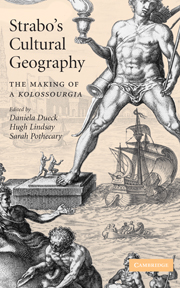Book contents
- Frontmatter
- Contents
- List of maps
- List of illustrations
- List of tables
- List of figures
- List of contributors
- Acknowledgements
- List of abbreviations
- Introduction
- 1 Kolossourgia. ‘A colossal statue of a work’
- 2 Reflections of philosophy: Strabo and geographical sources
- 3 Who is a barbarian? The barbarians in the ethnological and cultural taxonomies of Strabo
- 4 Gender at the crossroads of empire: locating women in Strabo's Geography
- 5 Strabo and Homer: a chapter in cultural history
- 6 Strabo's use of poetry
- 7 Strabo's sources in the light of a tale
- 8 The foundation of Greek colonies and their main features in Strabo: a portrayal lacking homogeneity?
- 9 Ανδρες ἔνδοξοι or ‘men of high reputation’ in Strabo's Geography
- 10 Comparing Strabo with Pausanias: Greece in context vs. Greece in depth
- 11 The European provinces: Strabo as evidence
- 12 Amasya and Strabo's patria in Pontus
- 13 Cappadocia through Strabo's eyes
- 14 Greek geography and Roman empire: the transformation of tradition in Strabo's Euxine
- 15 Josephus' hidden dialogue with Strabo
- 16 Temporal layers within Strabo's description of Coele Syria, Phoenicia and Judaea
- Bibliography
- Index of geographical names
- Index of personal names
2 - Reflections of philosophy: Strabo and geographical sources
Published online by Cambridge University Press: 18 December 2009
- Frontmatter
- Contents
- List of maps
- List of illustrations
- List of tables
- List of figures
- List of contributors
- Acknowledgements
- List of abbreviations
- Introduction
- 1 Kolossourgia. ‘A colossal statue of a work’
- 2 Reflections of philosophy: Strabo and geographical sources
- 3 Who is a barbarian? The barbarians in the ethnological and cultural taxonomies of Strabo
- 4 Gender at the crossroads of empire: locating women in Strabo's Geography
- 5 Strabo and Homer: a chapter in cultural history
- 6 Strabo's use of poetry
- 7 Strabo's sources in the light of a tale
- 8 The foundation of Greek colonies and their main features in Strabo: a portrayal lacking homogeneity?
- 9 Ανδρες ἔνδοξοι or ‘men of high reputation’ in Strabo's Geography
- 10 Comparing Strabo with Pausanias: Greece in context vs. Greece in depth
- 11 The European provinces: Strabo as evidence
- 12 Amasya and Strabo's patria in Pontus
- 13 Cappadocia through Strabo's eyes
- 14 Greek geography and Roman empire: the transformation of tradition in Strabo's Euxine
- 15 Josephus' hidden dialogue with Strabo
- 16 Temporal layers within Strabo's description of Coele Syria, Phoenicia and Judaea
- Bibliography
- Index of geographical names
- Index of personal names
Summary
Unlike its companion volume the History, Strabo's Geography has not only survived, but is essentially complete. His handling of inherited traditions can thus be studied as a coherent whole, and the early books, especially, offer a unique perspective on scientific enquiry and natural science during the early principate.
Strabo considered both geography and its sister science astronomy integral to the philosopher's study of the physical world. They were also essential to the education of those politicians and military administrators involved in Roman governance. The following passage from 1.1.14 is a brief example of the perspective repeatedly encountered in the first book of the Geography:
How could a person, setting out the differences between places, discuss these well and thoroughly if he hadn't considered [geography and astronomy] even briefly? And if it is not possible, because of the very political thrust of this work, to discuss everything in precise terms, still it is appropriate to do so to the extent that a political administrator is able to follow.
The lengthy introduction of 1.1, with its emphasis on empirical data, transmitted by qualified observers and evaluated against a body of accepted philosophical theory, reflects a methodology for natural history first presented by Aristotle. Within this tradition, geography, whether chorographical or ethnographical, was a subset of natural history, and this in turn was a recognised area of scientific philosophy. Such an approach was part of those philosophical/scientific studies being assimilated from Greece by the Roman world in the first century bce.
- Type
- Chapter
- Information
- Strabo's Cultural GeographyThe Making of a Kolossourgia, pp. 27 - 41Publisher: Cambridge University PressPrint publication year: 2005



